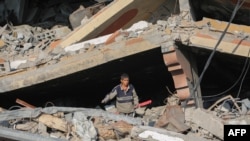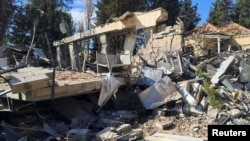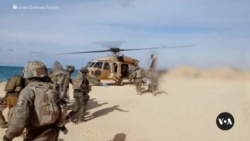Palestinian health officials said Tuesday a series of Israeli airstrikes killed at least 30 people in the Gaza Strip.
One strike late Monday hit a house where displaced families were sheltering in Beit Lahiya, killing at least 20 people, the officials said.
Other deadly strikes took place in Gaza City, Zuweida and Deir al-Balah.
Israel’s military said Tuesday its forces had killed militants and militant infrastructure sites in central and southern Gaza during the past day.
Lebanon conflict
The death toll in Lebanon surpassed 3,000 on Monday, in the 13-month-long conflict between Israel and Hezbollah, with the vast majority killed since hostilities dramatically escalated in mid-September and Israel invaded south Lebanon on October 1.
The Lebanese health ministry said more than 13,000 people have also been wounded. More than a million people have been displaced in the tiny country. Israel says the dead include hundreds of Hezbollah members. It also succeeded in assassinating the group’s top leader, Hassan Nasrallah, and several senior commanders.
In Israel, 72 people have been killed by Hezbollah rocket and drone attacks, including 30 soldiers, according to the prime minister's office.
Meanwhile, Lebanon’s caretaker prime minister, Najib Mikati, called for “immediate international pressure” to end the war with Israel, protect civilians and medical teams from attack, as well as the country’s cultural heritage, the National News Agency reported Monday. Israel has conducted repeated airstrikes over the ancient cities of Tyre and Baalbek, risking damage to their ancient ruins.
Mikati also had discussions with the ambassadors of the permanent five members of the U.N Security Council — Britain, China, France, Russia and the United States, as well as the European Union, about the situation.
Gaza aid
Rik Peeperkorn, World Health Organization representative in the West Bank and Gaza told reporters in a video call from Gaza on Monday that there were very few aid delivery missions to northern Gaza in October across U.S. agencies. Peeperkorn said the missions “got canceled, got impeded, got delayed.”
Currently, private imports are “virtually banned” and Israeli authorities are only allowing the use of three crossing points into Gaza — Kerem Shalom, Gate 96 (near central Gaza) and Erez West.
“Furthermore, humanitarian colleagues can only access these border areas by highly dangerous routes,” said U.N. spokesperson Stephane Dujarric. “The use of most roads leading to these entry points has either been banned by the Israeli authorities or rendered unsafe due to the ongoing hostilities.”
He said the routes available are often in poor condition and prone to looting by armed men.
The United Nations is also in the final phase of a massive polio vaccination campaign in Gaza, where the disease has been detected in wastewater. Peeperkorn said the goal is to vaccinate nearly 600,000 children under age 10 across the territory. They have reached more than 95% coverage in south and central Gaza, and in the first two days of vaccinations in northern Gaza reached nearly 95,000 children or about 79% of their target.
More than a year ago, Hamas militants killed 1,200 people and captured about 250 hostages in their October 7 attack on Israel that sparked the current war. Israel says it believes Hamas is still holding 101 hostages, including 35 the military says are dead.
Israel’s counteroffensive in Gaza has killed more than 43,300 Palestinians, according to the territory's Hamas-run health ministry, which does not distinguish between combatants and civilians in its count.
Hamas and Hezbollah have been designated terror groups by the United States and other Western countries.
VOA United Nations Correspondent Margaret Besheer contributed to this report. Some material in this report came from The Associated Press, Reuters and Agence France-Presse.










